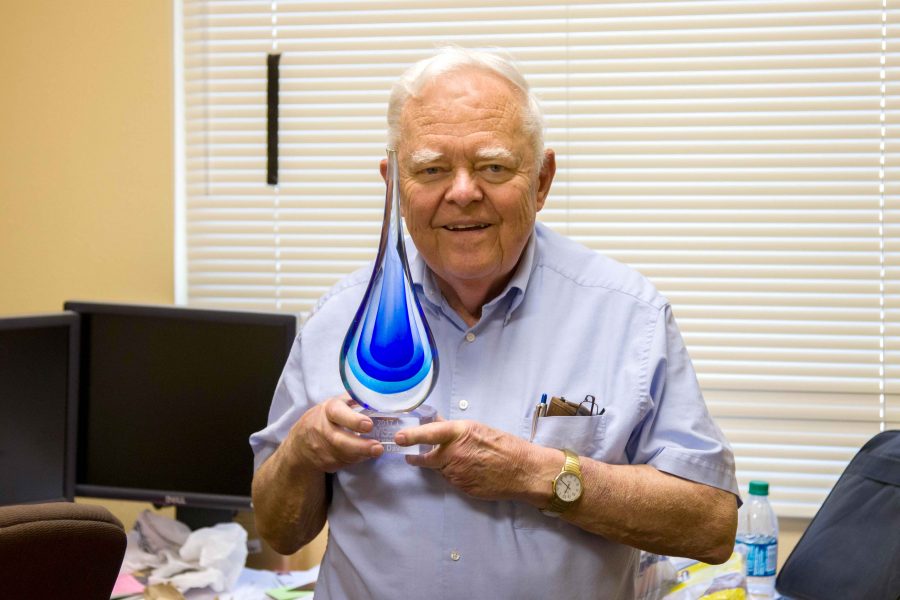Last month, Thomas Davis, a civil engineering professor and director of the Center for Inland Desalination Systems (CIDS) at UTEP, received the Salt of the Earth Award from the Multi-State Salinity Coalition. This award recognizes the contributions and dedication of industry leaders in the water industry.
“I was really honored that they had selected me for that award, I just didn’t expect it. I didn’t know I deserved that kind of honor, but I was really thankful for I got it,” Davis said.
Davis holds 16 patents for technology products. He has developed a desalination process that uses a combination of reverse osmosis and another process that separates calcium and sulfate, two components of gypsum, from the water.
Associate director for CIDS, Malynda Cappelle, works with Davis in the engineering department, said Davis is one of the most dedicated persons she knows.
“Tom spends a lot of time in the laboratory developing and testing new technologies, ranging from finding new ways to desalinate water to figuring out new ways of detecting hardness and other species in water,” Cappelle said in an email interview. “He’s a very creative individual. I think he invents things when he is sleeping.”
Davis said El Paso is in an unusual position, when the Rio Grande is not flowing the city must get all its water from the ground, which is becoming salty.
“Our research center is involved in doing research to improve the desalination process so people can use and drink it,” Davis said. “We are trying to minimize salt that is going to the river and try to minimize the salt that is used by water softeners and possibly even recover that salt to use it over and over again.”
Davis earned his doctorate in chemical engineering from the University of South Carolina, and has been at UTEP for more than eight years after a conversation with UTEP President Diana Natalicio.
“She has a vision of educating the Hispanic community here and having people go out in the world and do good things,” Davis said. “She was the one who convinced me and it was worth it.”
Davis left his research at the University of South Carolina, a decision he said he does not regret.
“I was doing desalination research in a place where they really don’t need it. They got plenty of fresh water in South Carolina,” Davis said. “I’m happy a came to a city where the research would matter more than it would in a place where there is already plenty of fresh water.”
Davis said working in the laboratory and creating things is a big motivation in continuing doing the work he likes.
“Teaching was satisfying, I taught a thermodynamics class a couple of years ago, but it took a lot of time away from my research,” Davis said. “If I weren’t here (in my office) I would be in the laboratory working on something. I really enjoy working there, it’s so satisfying. When I sit at my desk and use my computer I just think about things I could be doing in the laboratory and I really want to get back there and try it.”
Davis said that new technologies for the conservation and desalination of water are created so future generations will benefit from them.
“This will give job opportunities for students that are coming out of school,” Davis said. “These things help us keep clean and drinkable water, but at the same time it helps our community.”
Davis said he would keep on working as long as his mind and body allow him to do so. He said retirement will never part him from UTEP and El Paso.
“I love it here! El Paso people are great people and I just really love UTEP and I love the chance to live in El Paso,” Davis said. “I ultimately would go back to South Carolina, but of course I’m going to miss this university.”










